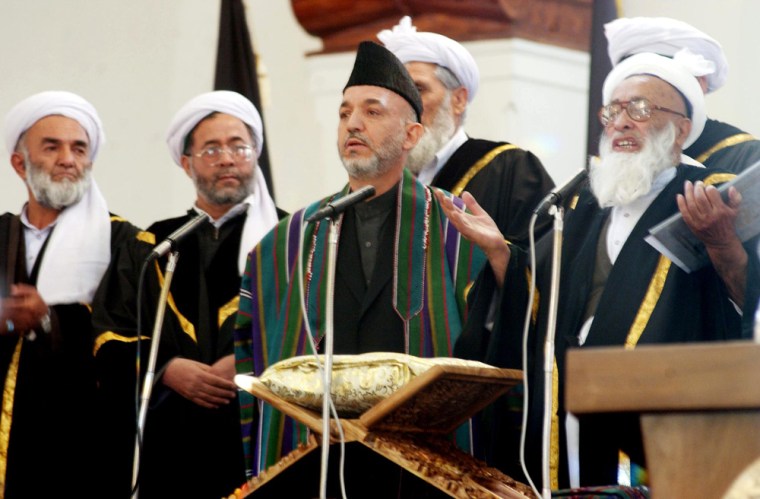Hamid Karzai was sworn in Tuesday as Afghanistan’s first popularly elected president, opening a new chapter for the impoverished country while warning that the wars against terrorism and drugs will require sustained international help.
A smiling Karzai, wearing a traditional green robe and a black lambskin hat, received a standing ovation on his arrival. Vice President Dick Cheney, the highest-ranking American official to visit Afghanistan since the fall of the Taliban in 2001, was among the 600 guests.
After the Afghan national anthem reverberated around a restored hall of the war-damaged former royal palace, Karzai placed his right hand on a copy of the Quran, Islam’s holy book. He repeated an oath of allegiance read to him by Afghanistan’s white-bearded chief justice, Fazl Hadi Shinwari.
Karzai then swore in his two deputies, Ahmad Zia Massood and Karim Khalili, members of the country’s two largest ethnic minorities.
In his inaugural speech, Karzai said the hopes of ordinary Afghans would drive him during what is likely to be a tough five-year term and reiterated his main pledges — cracking down on drugs, disarming militias and raising living standards.
“We have now left a hard and dark past behind us and today we are opening a new chapter in our history in a spirit of friendship with the international community,” Karzai said, speaking in Pashto and Dari, Afghanistan’s two main languages.
He said the fight against terrorism was “not yet over” and urged sustained international aid and cooperation to defeat increasing links between extremists and drug-trafficking.
“The same cooperation has led to the rebuilding of the Afghan state and significant progress in restoring peace, stability and security to our country.”
Tight security
Wary of attacks by Taliban or al-Qaida militants, Afghan and international forces launched their biggest security operation since the Oct. 9 election that gave Karzai a landslide victory. Police sealed off the 2.5-mile route from Kabul’s airport to the palace, and NATO troops patrolled the city on foot.
Cheney, arriving at the main U.S. base north of Kabul early Tuesday, congratulated some of the 17,000 U.S. troops here for helping give democracy a chance to take root.
“For the first time the people of this country are looking confident about the future of freedom and peace,” Cheney said. “Freedom still has enemies here in Afghanistan, and you are here to make those enemies miserable.”
Before the ceremony, Karzai, who had been interim leader and was formally elected in an Oct. 9 vote, thanked the United States, his main sponsor, for its help.
“Without that help, Afghanistan would be in the hands of terrorists,” he said. “Terrorism as a force in gone. As individuals they are all around and we will continue to look for them.”
Parade of dignitaries
The list of 150 dignitaries included U.S. Secretary of Defense Donald Rumsfeld, Iranian Foreign Minister Kamal Kharrazi and Pakistan’s Interior Minister, Aftab Khan Sherpao. Lakhdar Brahimi, special adviser to U.N. Secretary-General Kofi Annan, represented the world body.
Rumsfeld cautioned that the military mission here is not over.
“There are still groups, extremists, that would like to take this country back — the Taliban, the al-Qaida — and use it for a base for terrorist activities around the world as they did on 9/11,” Rumsfeld told a group of special forces soldiers at Bagram. “But it’s not going to happen.”
Annan warned in a report to the Security Council that unless Karzai tackles Afghanistan’s surge in opium production and its arms proliferation, much of its recent progress could be seriously undermined and “the economy may well be subsumed by the illicit drugs industry.”
Karzai’s inauguration offers the opportunity to select a Cabinet “that is able to extend government authority throughout the country and deliver the basic services,” Annan said.
The U.S.-backed leader’s inauguration is the culmination of a three-year drive to transform Afghanistan from a training ground for al-Qaida extremists into a moderate Islamic republic.
Under Karzai’s interim leadership, Afghans adopted a new constitution labeled by the United States as the most progressive in the region and held their first Western-style vote, despite militant attacks that killed at least 15 election workers.
Threat from narcotics trade
Some 3 million Afghan refugees displaced by more than two decades of warfare have returned home, and women and girls are back in jobs and schools from which they were barred under the previous regime. The economy is growing strongly.
But Karzai faces daunting challenges during his five-year term.
Insurgents continue to harass U.S. and Afghan forces across a broad swath of the south and east. American officials expect to keep their force strength at about 18,000 at least until after parliamentary elections slated for the spring.
U.N. surveys also show cultivation of opium poppy in Afghanistan, from which most of the world’s heroin is refined, jumped more than 60 percent this year, and warn that drug smuggling mafias are taking an iron grip on the country.
Afghanistan’s red, black and green flag has been hung from lampposts in downtown Kabul, and officials issued a commemorative blue stamp featuring a triumphant-looking Karzai. The proceedings were shown live on national television — where rickety power supplies permitted.
“We hope he brings peace, stability and employment for us,” shopkeeper Ahmed Khan said in Kandahar.
